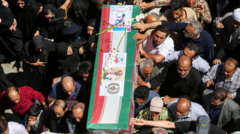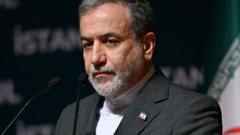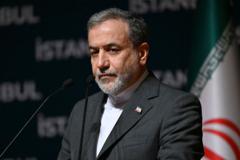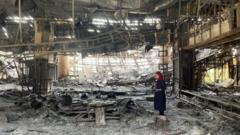In a striking statement during a White House press briefing, President Donald Trump indicated he would "absolutely" contemplate bombing Iran again, emphasizing military action if intelligence deemed Iran's uranium enrichment levels alarming. Amidst recent conflict, both nations claim victory while Iran's foreign minister acknowledges substantial damage to its nuclear sites.
Trump Signals Potential for Renewed Military Action Against Iran

Trump Signals Potential for Renewed Military Action Against Iran
Amid ongoing tensions, President Trump expresses willingness to consider military strikes against Iran if nuclear threats escalate.
President Donald Trump has recently made headlines by asserting he would "absolutely" consider military strikes against Iran once more, should intelligence indicate a perilous enrichment of uranium. This alarming statement came during a White House press briefing where Trump responded to media inquiries about the escalating tensions between the United States and Iran.
Last weekend, the U.S. escalated its involvement in the longstanding conflict between Israel and Iran, executing targeted bombings on critical nuclear sites using advanced "bunker buster" bombs. However, just as swiftly, Trump sought a ceasefire, yet not without defending the actions taken, claiming that Iran's nuclear sites had been decisively "obliterated."
Iran's Supreme Leader Ayatollah Ali Khamenei publicly dismissed the U.S. strikes as ineffectual but faced a reality check when his foreign minister, Abbas Araghchi, conceded that the bombings caused "excessive and serious damage" to the nation's nuclear facilities. The rapid exchange of claims and counterclaims highlights the deeply fragmented narratives surrounding the conflict, with Trump adamantly stating that Khamenei is misleading the Iranian populace about the war's outcomes.
Complicating matters, Trump's recent social media activity revealed details about Khamenei's whereabouts during the conflict, indicating that the Iranian leader was forced into hiding amidst the strikes. Despite the chaos, both Iran and its adversaries have hailed their own versions of victory, with Khamenei asserting that Iran's nuclear ambitions remain intact.
In a developing scenario, Trump insinuated he had been contemplating easing sanctions on Iran but swiftly abandoned those negotiations following the Iranian leader’s vitriolic remarks. Iran has historically maintained that its nuclear program is strictly for civilian use, a position that is increasingly challenged by Israel's aggressive military posture and Trump's robust rhetoric.
The renewed hostilities began with coordinated Israeli strikes aimed at crippling Iran's nuclear capabilities, which Israeli Prime Minister Benjamin Netanyahu claimed could lead to Iran developing a nuclear weapon "in a very short time" if left unchecked. As casualties mount, with reports indicating 610 deaths in Iran due to the airstrikes and 28 fatalities in Israel, the prospects for diplomatic resolution seem increasingly tenuous.
While the Biden administration is weighing various strategies to coax Iran back into negotiations, including financial support for civilian nuclear initiatives, Tehran seeks to distance itself from talks with the U.S., particularly in light of Trump's recent NATO summit remarks hinting at renewed dialogue.




















